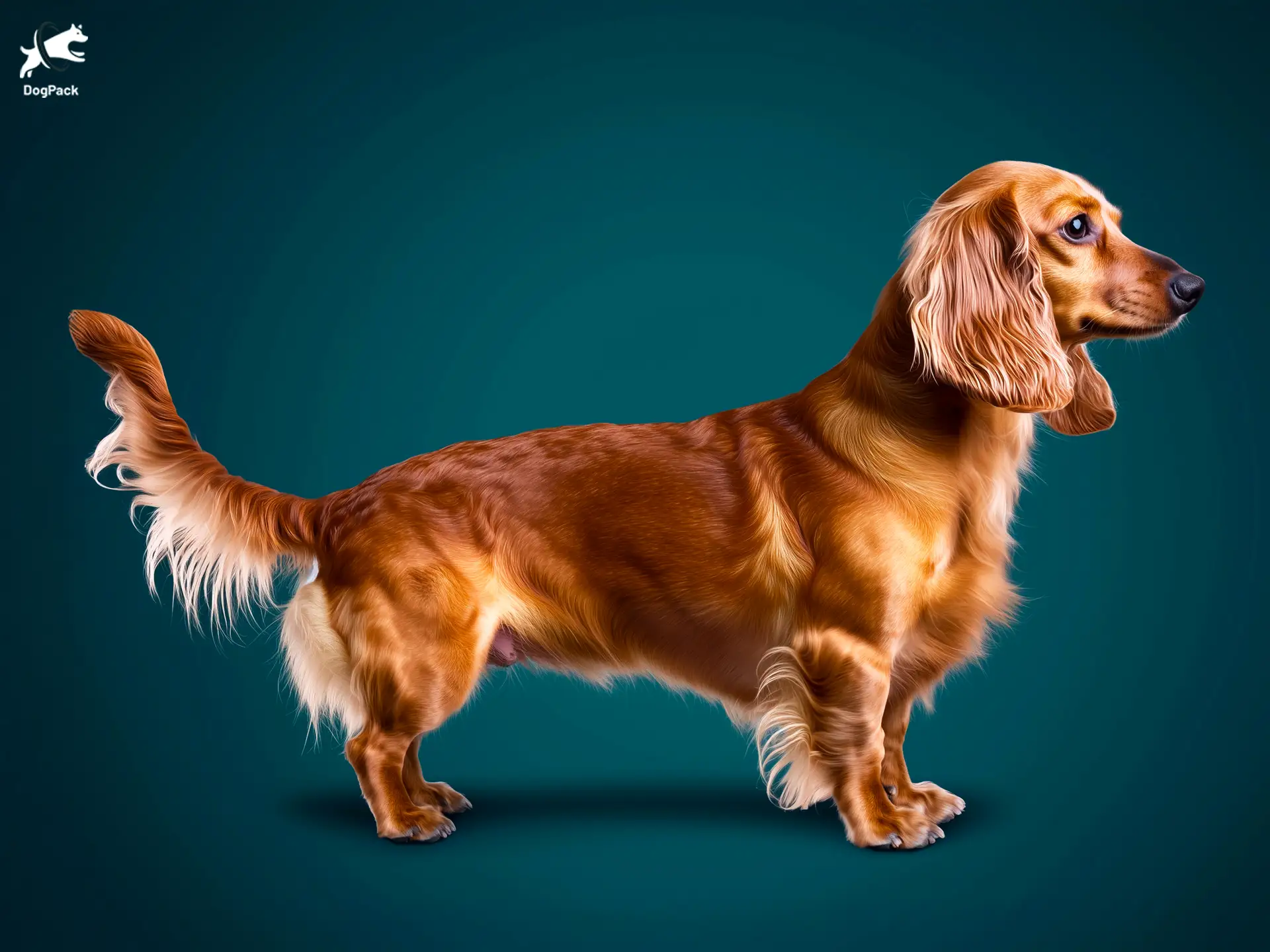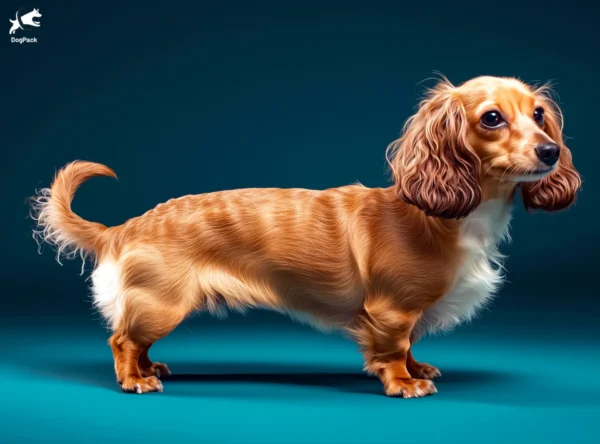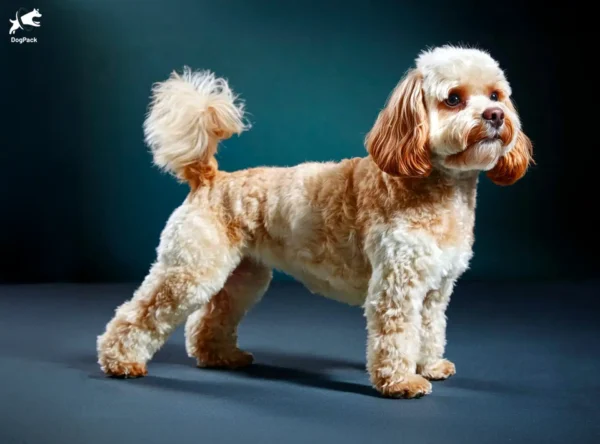Docker Dog Breed Info & Overview
Ever heard of a Docker? No, not the software platform—I’m talking about the adorable mix between a Dachshund and a Cocker Spaniel! This delightful crossbreed combines the best of both worlds: the playful spirit of the Dachshund and the gentle nature of the Cocker Spaniel. If you’re looking for a compact companion with a big heart, the Docker might just be your new best friend.
Characteristics
Pictures
Breed History
Ever wonder why Dockers have a mix of spunk and sweetness? This crossbreed emerged in the U.S., where breeders combined the Dachshund’s fearless attitude with the Cocker Spaniel’s gentle side. Although their exact origins aren’t fully documented, Dockers quickly gained popularity as more families noticed their unique charm and adaptability.
The Docker inherits a history steeped in purpose: the Dachshund’s roots in Germany as a tenacious badger hunter and the Cocker Spaniel’s reputation in England as a skilled bird retriever. Together, this blend gives Dockers a delightful mix of hunting instinct and family-friendly qualities.
Today, while not recognized by major kennel clubs, Dockers are cherished for their loyal, adaptable personalities. These designer dogs may have a short history, but they’ve already captured the hearts of families across the country.
Temperament, Personality
Dockers might just be the perfect combination of playfulness and gentleness. With a dose of Dachshund spunk and Cocker Spaniel sweetness, they’re affectionate family pets who love spending time with their people. If there are kids around, Dockers are usually thrilled—just prepare for an extra enthusiastic playmate!
Intelligent and eager to please, Dockers are generally easy to train. However, a hint of the Dachshund’s stubborn streak might peek through, so patience (and treats!) go a long way. Positive reinforcement is key to bringing out their best behavior.
Their balanced temperament makes Dockers adaptable to different lifestyles. Whether you’re an active adventurer or a cozy homebody, they’re happy as long as they’re included. Dockers are quick to sense the vibe and tailor their personality to the environment—what more could you ask for?
Physical Characteristics
Dockers tend to have a unique look that mixes traits from both parent breeds. They typically have a long, sturdy body with short legs from their Dachshund lineage, while the Cocker Spaniel influence often shows in their soft, wavy coat and expressive eyes. Those floppy ears? Pure charm!
Colors can range from black and brown to tan or mixed shades, giving each Docker a unique appearance. While some have a sleek coat like the Dachshund, others take after the Cocker with a fuller, more feathered coat that adds to their appeal. Whichever they inherit, they’re easy on the eyes.
Their compact size makes them well-suited for apartment living, though they love a good romp at the park or in the yard. Dockers are a delightful blend of form and function, embodying traits of both their hunting and companion heritage.
Health Issues
Dockers are generally healthy dogs, but they can inherit a few conditions from their parent breeds. Back issues like Intervertebral Disc Disease (IVDD) may arise due to their long body, so it’s important to manage their weight and discourage too much jumping.
Other potential issues include hip dysplasia and ear infections—especially if they’ve got those adorable floppy ears. Regular ear cleaning and vet check-ups can help keep these concerns at bay. And let’s not forget dental health; Dockers are prone to tartar buildup, so keep those teeth brushed.
If you’re purchasing from a breeder, ask about the health history of both parent breeds. Responsible breeding practices are essential for minimizing genetic risks and ensuring a healthier, happier Docker.
Grooming Needs
Dockers’ grooming needs depend on their coat type. If they inherit the Cocker Spaniel’s lush, wavy fur, they’ll need regular brushing to prevent tangles and mats. A slicker brush and comb can keep their coat looking fresh and free of knots.
Bathing should be done occasionally or when needed, with a gentle dog shampoo to keep their skin healthy. Floppy ears need special attention—check them weekly for signs of infection, as moisture can easily get trapped.
Nail trims and dental care are equally important. Regular nail trims help prevent discomfort, and brushing their teeth a few times a week can stave off dental issues. With a little maintenance, your Docker will stay happy, clean, and ready for cuddles.
Exercise Requirements
Dockers may be small, but they’re surprisingly energetic! They need about 30 to 60 minutes of daily exercise to stay fit and content. Walks, yard playtime, and games like fetch or tug-of-war are favorites—especially if they involve some good old-fashioned exploration.
These pups also benefit from mental stimulation, so try incorporating puzzle toys or simple obedience training into their day. Remember, a worn-out Docker is a happy Docker. Regular exercise will keep them calm and prevent those pesky boredom-related habits.
Just watch out for their Dachshund heritage! They may have a strong prey drive, so it’s wise to keep them on a leash during walks, lest a squirrel or bird triggers their inner hunter.
Training Tips
Training a Docker can be a rewarding experience, thanks to their intelligence and eagerness to please. They respond well to positive reinforcement, so stock up on treats, praise, and patience. With a touch of Dachshund stubbornness, consistency will be your best friend.
Early socialization is also essential. Introduce them to a variety of people, places, and other animals to ensure they’re well-adjusted as adults. Obedience classes can be a great addition, helping them hone their social skills and stay mentally stimulated.
Avoid harsh training methods, as Dockers can be sensitive. Gentle guidance and rewards will bring out the best in them. With the right approach, your Docker will be a polite, friendly companion.
Nutrition, Diet
Feeding a Docker calls for a bit of attention to portion sizes and nutrition. As small-to-medium dogs, they generally need about 1 to 1.5 cups of high-quality dry dog food daily, split into two meals. Protein-rich foods support their muscles, while healthy fats keep their coat shiny.
Since they’re prone to back issues, monitoring their weight is essential. Obesity can put unnecessary strain on their spine and joints, so avoid too many treats (no matter how cute they look while begging!). Some foods with Omega-3 and Omega-6 can support coat health, too.
Always provide fresh water and consult your vet for specific dietary needs based on your Docker’s age, size, and activity level. A balanced diet keeps them energized and ready for playtime!
Adoption, Breeders
Considering a Docker for your family? Adoption is a fantastic choice, with many shelters and rescues having wonderful Dockers waiting for homes. Sites like Petfinder often feature Dockers available for adoption.
If you’re set on a breeder, make sure to choose a reputable one. Look for breeders who perform health screenings on both parent breeds and are transparent about lineage. The Designer Breed Registry is a reliable resource for finding ethical breeders who prioritize health.
Steer clear of puppy mills or breeders without proper documentation. A little research can go a long way in ensuring you bring home a healthy and happy Docker companion.
Family Pet?
Dockers can make excellent family pets, especially for households looking for a friendly and adaptable companion. Their moderate size and balanced temperament mean they can thrive in both active and relaxed environments. They’re known for being good with kids and can even adapt well to apartment life.
When introduced early, Dockers tend to get along with other pets, although supervision around smaller animals is advised due to their potential prey drive. Their loving nature shines when they feel included as a true member of the family.
In short, Dockers are well-suited for families who want a loyal, affectionate, and interactive pet. They’re sure to bring joy to any household.
Right For You?
Thinking about a Docker? These dogs thrive with families who can provide moderate exercise and enjoy their playful nature. While Dockers don’t need an athlete-level workout, they appreciate daily walks and some quality playtime.
Consider your ability to meet their grooming and training needs. While Dockers are generally easy to train, a gentle yet consistent approach is essential. If you’re ready for a loving, adaptable companion that fits in with your family’s lifestyle, the Docker may be your perfect match.
Whether you’re a city dweller or suburban explorer, the Docker has the right balance of affection, loyalty, and playfulness to fit into a variety of homes.
Conclusion
The Docker offers a delightful mix of Dachshund spunk and Cocker Spaniel sweetness, creating a unique companion for any dog-loving family. From their moderate exercise needs to their loving nature, Dockers bring a bit of everything to the table. If you’re seeking a playful, affectionate dog that’s great with family members of all ages, the Docker might be just what you’re looking for.
FAQs
-
What’s the ideal home environment for a Docker?
Dockers thrive in homes where they receive plenty of attention and activity. While they can adjust to various living situations, they do best with an active family that can provide both indoor play and outdoor walks.
-
Are Dockers prone to chasing small animals?
Yes, Dockers may inherit a strong prey drive from their Dachshund lineage, which can lead them to chase smaller animals. Training and a secure yard help prevent this instinct from becoming a problem.
-
Do Dockers require mental stimulation as part of their routine?
Dockers are intelligent and benefit from daily mental stimulation, such as puzzle toys, training exercises, or scent games. Keeping their minds engaged helps reduce boredom and encourages positive behavior.
-
How do Dockers respond to training for off-leash activities?
While Dockers can be trained for off-leash activities, their hunting instincts may make recall challenging. Training should start early and focus on strong recall commands, but they may still need supervision in open areas.
-
Are Dockers known to be lap dogs?
Yes, Dockers often enjoy being close to their family and can be affectionate lap dogs. Their small to medium size and love for companionship make them ideal for curling up beside their favorite people.
Breed Ratings
Dockers are smart and quick learners, especially when motivated with treats and praise.
They have a playful spirit and enjoy interactive games with their families.
Moderate energy levels make them adaptable to various lifestyles.
Shedding is moderate; regular grooming helps manage loose hair.
May have some prey instincts due to their Dachshund heritage.
Moderate grooming needs, especially if they have a longer coat.
Generally responsive to training with positive reinforcement.
They prefer company and may experience separation anxiety if left alone too long.
Can be somewhat vocal; training can help manage this.
Low drooling tendency.
Usually gets along well with other dogs if socialized early.
Generally healthy but watch for breed-specific health issues.













